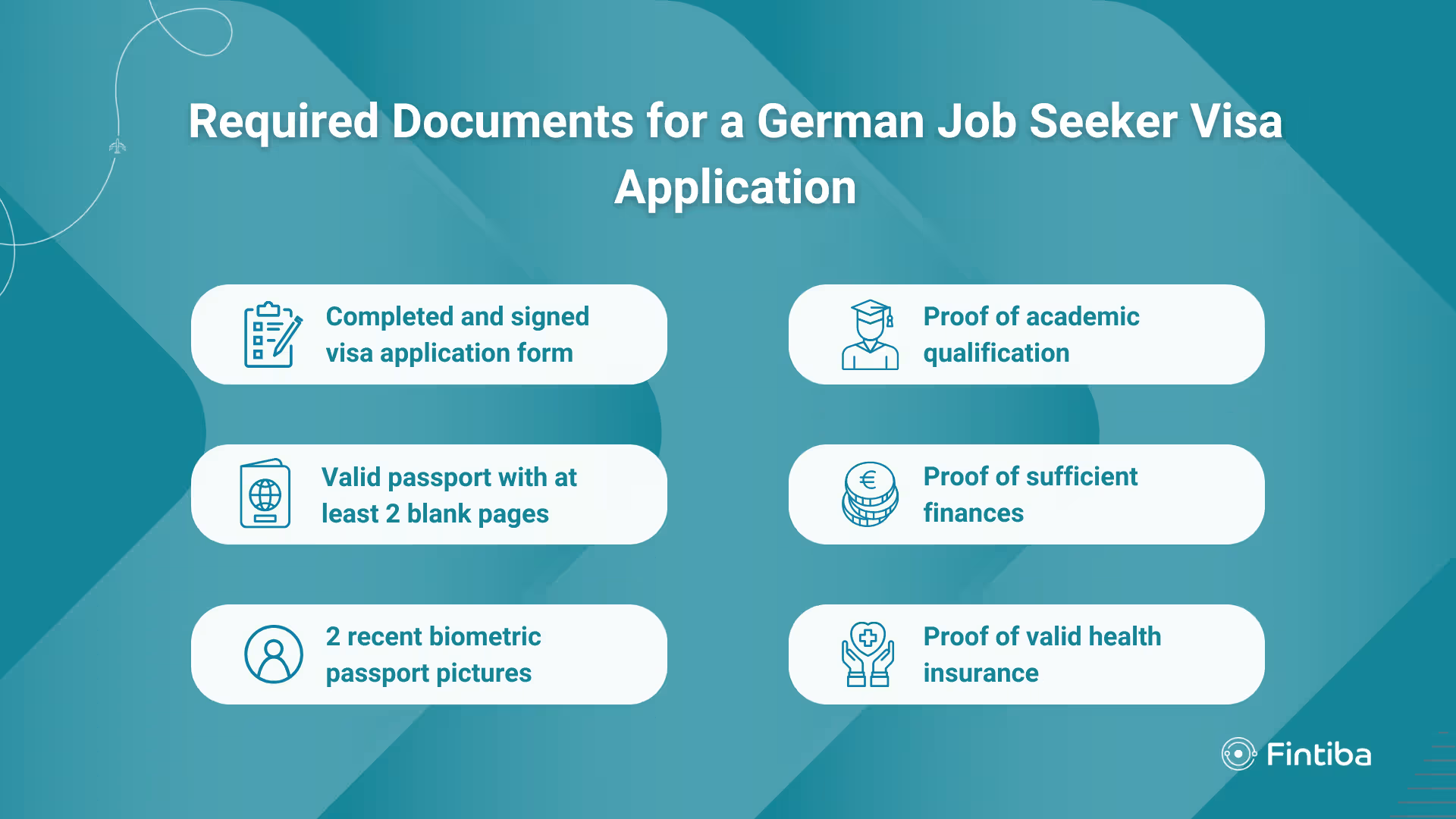德國求職簽證的推出是為了吸引來自世界各地的技術人才。自此之後,德國求職簽證成為希望在這個歐洲強國工作和定居的國際人士的重要門戶。
什麼是德國求職者簽證
德國的求職者簽證允許完成德國大學課程的國際學生在德國尋找 工作機會,最長可達 18 個月。
在這段時間內,他們可以探索就業市場、參加就業面試,並與潛在僱主聯繫。
目的和逗留時間
求職簽證的目的是讓應屆畢業生有機會從學習或訓練轉型為全職工作,而不必離開德國。逗留有效期最長為 18 個月,在您順利完成學業或職業訓練後立即開始,而不是從您提出申請之日起算。
簽證允許您在德國做什麼
- 尋找符合您學術或職業資格的工作。
- 在尋找工作期間,從事任何工作(包括無關的臨時工作)以支付生活費。
- 一旦您獲得合格的職位,請直接申請工作居留許可 或歐盟藍卡。
申請德國求職者簽證的資格
如果您在德國完成了認可的學位(學士、碩士或博士)或職業資格,您就有資格申請德國求職者簽證。
您也必須證明您有足夠的經濟能力在求職期間養活自己,這通常可以透過「承諾聲明」或「封閉帳戶」來完成。此外,您需要在整個逗留期間持有有效的健康保險 。
值得一提的是,以前在德國完成學位或職業訓練的人可以尋找長達 18 個月的工作,而專程來德國找工作的國際人士可以持有六個月的求職者簽證。
後一種類別現在已被機會卡所取代。根據現行規定,只有從德國大學畢業或在德國完成職業訓練的學生才能持有求職簽證。
德國求職者所需文件簽證申請申請
在申請德國求職簽證時,您必須向當地的Ausländerbehörde 出示一套完整的文件。遺漏或不正確的文件可能會延誤甚至阻礙您的申請,因此事先準備好一切文件是非常重要的。

申請表及有效護照
您需要填寫正式的居留許可 請表,並出示有效護照。護照必須在整個預定逗留期間有效,並有足夠的空白頁供簽證背書之用。
Biometric 照片
提供兩張護照尺寸的biometric 近照。這些照片必須符合德國biometric 標準:中性臉部表情、淺色背景和正確尺寸 (35mm x 45mm)。
資格和認可證明
提交您的最終學位證書或由德國機構簽發的職業培訓結業文件。如果適用,請附上正式成績單或國家認可的資格證明。
專業履歷和動機信
一份完整的個人履歷 (CV),概述您的教育背景、工作經驗和技能,外加一封解釋動機的信:
- 您在德國的職業目標。
- 您尋求的職位類型。
- 您的資歷如何與德國就業市場相匹配。
足夠經濟能力的證明
您必須證明自己在整個求職期間都能自給自足,而無需依賴公共基金。如果您沒有任何收入來源,您有兩個選擇:
封閉帳戶作為主要的資金證明
最常見的方法是開立一個封閉帳戶 (Sperrkonto),至少每月最低金額 (2025 年為 992 歐元) 乘以您打算停留的時間,最長為 18 個月。
其他已接受的證明
您可以提交已經在德國居住並能夠在經濟上支持您的贊助人的承諾聲明 (Verpflichtungserklärung),而不是封閉帳戶。
健康保險 覆蓋整個逗留期間
在您找工作的整個過程中,有效的健康保險 是必須的。您可以延長您的學生保險(如適用),或轉換到符合德國要求的私人或公共保險計劃。
德國求職簽證的 Fintiba 解決方案
滿足財務要求是您簽證申請德國求職簽證申請的關鍵環節。Fintiba為國際申請者提供經官方認可的解決方案,讓此步驟既簡便又安全,同時完全符合德國法規要求。
若您沒有固定收入來源,Fintiba封閉帳戶 您可靠地證明具備足夠資金支應在德國的居留需求。此帳戶獲德國當局認可,確保您在尋找合資格工作期間能負擔生活開銷。
德國求職者簽證費用和處理時間
在申請之前,重要的是要知道申請費用是多少,以及需要多久才能收到決定。提前規劃可確保您不會在新簽證簽發前,因目前的居留許可 到期而遇到問題。
目前的申請費用
德國求職簽證的標準費用為75 歐元。在Ausländerbehörde(外國人辦事處)提交申請時支付此費用。有些辦事處接受信用卡付款,但許多辦事處需要現金,因此請事先確認。即使您的申請被拒絕,此費用也不會退還。
典型處理時間及申請時間
處理時間通常為4 到 6 週不等,視您當地移民局的工作量以及您的文件是否完整而定。
最好在完成學業或訓練後儘快申請,最好是在您目前的學生居留許可 到期前幾週提出申請。
請記住,18 個月的簽證有效期是從您正式完成學業的日期開始計算,而不是從您獲得簽證的日期開始計算。
如何申請德國求職者簽證
申請程序簡單直接,但遺失文件或資訊不正確可能導致延誤,因此請務必仔細遵循每個步驟。
檢查資格和準備文件
申請前,請確認您符合所有資格要求,包括已在德國完成學位或職業訓練,並能證明有足夠的經濟能力。提前收集好所有需要的文件,避免在最後一刻出現問題。
正確填寫申請表
填寫當地Ausländerbehörde 提供的官方求職者簽證申請 申請表。填寫所有欄位,使用與您的證明文件相符的詳細資料。
預約並參加簽證預約
Ausländerbehörde 的預約通常會提前數週,因此請儘早預約。請攜帶您的申請表、現有居留許可所有證明文件的居留許可印本。
準備面試
在預約期間,移民官可能會詢問您的求職計劃、目標行業和財務狀況。請準備好解釋您打算如何在允許的 18 個月期限內找到工作。
提交申請及跟進
提交申請後,您會收到確認通知。處理過程可能需要數週時間,因此請密切注意您的申請狀態,並迅速回應任何補充文件的要求。
求職簽證期間的工作許可證

由於德國求職簽證的主要目的是尋找全職工作,因此您在逗留期間的工作權利非常有限,以免分心找工作。
試用雇用規則
每位雇主允許您參與最多兩週的短期試用 (Probearbeit)。這是一個寶貴的機會,可以向潛在雇主展示您的技能,並增加您獲得永久職位的機會。
但是,試工必須遵守勞工法,如有需要,應向移民局報告。
持德國求職簽證獲得工作機會後的下一步措施
一旦您找到一份符合您資格的工作,您就需要更改您的簽證身份,以便您可以在德國合法地從事全職工作。下一步取決於工作類型和您的薪資水平。
轉換為居留許可 就業
如果您的新工作不符合歐盟藍卡的要求,您可以申請標準的就業居留許可 。
此許可證與您的特定職務和雇主相關聯,因此如果您轉換工作,您必須通知外國人管理局 (Ausländerbehörde),在某些情況下,您必須重新申請。
申請歐盟藍卡
歐盟藍卡適用於高素質的專業人士,可讓您更快取得永久居留權。如果您計劃在德國長期居留,並希望在歐盟就業市場上有更大的靈活性,那麼藍卡尤其具有吸引力。
薪資門檻與資格要求
要符合申請歐盟藍卡的資格,您一般需要
- 認可的大學學位(德文或同等的外國學位)。
- 與您的資格領域相關的工作合約或具有約束力的工作要約。
- 最低年薪總額為48,300 歐元(2025 年的數字),或工程、IT 或醫療保健等短缺職業為43,992 歐元。
向當地外國人管理局提交文件
要完成過渡,您必須向當地的 Ausländerbehörde 提出申請。典型的文件包括
- 您的工作邀約或已簽訂的僱傭合約。
- 資歷證明(如適用,學位認可)。
- 健康保險的證明。
- 您目前的居留許可 和護照。
- 填妥的申請表格和費用支付。
一旦獲得批准,您的新許可證將允許您全職工作,如果是歐盟藍卡,則可在歐盟各地享有額外的流動權利。
如果您在簽證期限內找不到工作的選擇
如果您的求職簽証即將過期,而您又沒有找到工作,那麼您的選擇將受到限制,但仍有幾種可能的途徑讓您合法地留在德國:
- 報讀進修或訓練課程 - 如果您報讀認可的學位課程、語言課程或職業訓練課程,您可以轉換為學生簽證。這需要入學證明和足夠的經濟能力。
- 申請「機會卡」- 如果您符合積點要求,即使您的求職簽証到期,新的「機會卡」也可以讓您留在德國找工作。
- 變更為其他居留許可- 在某些情況下,您可能符合申請家庭團聚簽證、自雇簽證或其他居留許可的資格,這取決於您的個人情況。
如果以上兩種選擇對您來說都不可行,您可以隨時返回您的國家,加強您的資歷或德語技能,並在未來重新申請機會卡。
重要的是不要逾期居留,因為這會損害您日後獲得任何德國或歐盟許可證的機會。
會議健康保險 要求
當您申請德國求職簽證時,必須持有有效的健康保險 證明。您必須在目前的許可證過期之後,直到您的求職簽証計劃逗留期限結束為止,都必須申請健康保險。您必須確定您的健康保險 計劃有以下內容:
- 最低 30,000 歐元的醫療費用保障。
- 住宿期間不適用。
- 有效期為整個簽證期間(最長 18 個月)。
德國國際人員的工作搜尋平台
如果您是當地市場的新手,在德國找工作可能會很具挑戰性,但有一些專為國際人士而設的求職平台,雇主會在這些平台上尋找全球人才。
CareerBee 總覽及涵蓋角色
CareerBee 專門將技術工人和畢業生與德國招聘國際人才的公司聯繫起來。
他們提供 IT、工程、醫療保健和企業管理等領域的工作職缺。CareerBee 還提供申請研討會、履歷審查和面試準備服務,以提高您的成功機會。
Expatino 概觀與涵蓋角色
Expatino 是另一個專門協助非德語人士在德國找工作的平台。他們提供初創企業、國際企業和酒店業的工作機會。
該平台還包括搬遷建議、住房貼士和交流活動,讓您更順利地融入德國生活。
常見問題
尋找有關德國簽證常見問題的答案。
誰有資格申請德國的求職簽證?
若您持有經認可的大學學位或職業培訓證書,並能證明擁有足夠資金支付求職期間的生活開支,同時具備健康保險證明,即符合申請德國求職簽證的資格。
德國求職者簽證申請的核准率是多少?
儘管沒有公佈官方統計資料,但對於符合所有要求的申請人來說,批准率是很高的。大部分拒絕的原因是文件不完整或資金證明不足。
申請德國求職者簽證所需的資金是多少?
您必須證明您有足夠的資金支付整個簽證期間的生活費用。通常的基準是每月 992 歐元(截至 2025 年)。大多數申請人使用封閉帳戶 來證明這一點,但承諾聲明也可能被接受。
德國求職者簽證還能用嗎?
是的,但現在主要是針對德國大學和職業課程的畢業生。沒有德國資格的技術勞工應申請機會卡。
持求職簽證能在德國停留多久?
如果您在德國大學畢業或在德國完成認可的職業培訓,簽證的有效期可長達 18 個月。倒計時從您正式完成學業或培訓開始計算,而不是從簽證簽發開始計算。
持有德國求職簽證時可以工作嗎?
可以,但有限制。您可以從事兼職或臨時工作,在某些情況下,也可以與潛在雇主試工。您停留的主要目的仍必須是尋找工作。
我能否持求職簽證離開德國?
是的,您在持有求職簽證期間可以離開德國。但請注意,您在德國境外停留的總時間不得超過六個月,否則您的求職簽證將被撤銷。
我可以延長我的德國求職簽證嗎?
求職者簽證不能延長至超過最長 18 個月的期限。如果您在這段時間內沒有找到工作,您就需要離開德國或從國外申請其他類型的簽證。
在德國可以將旅遊簽證轉換為求職簽證嗎?
您不能在德國境內將旅遊或申根簽證轉換為求職簽證。您必須從您的原居住國或合法居住國提出申請。
我可以在德國境內申請德國求職者簽證嗎?
如果您已經持有學生居留許可 或其他長期簽證,您可以在現有許可到期前直接向當地的 Ausländerbehörde 提出申請。
取得您的簽證就緒套裝行程
透過我們為您量身打造的一站式簽證解決方案,開始您的德國之旅。





